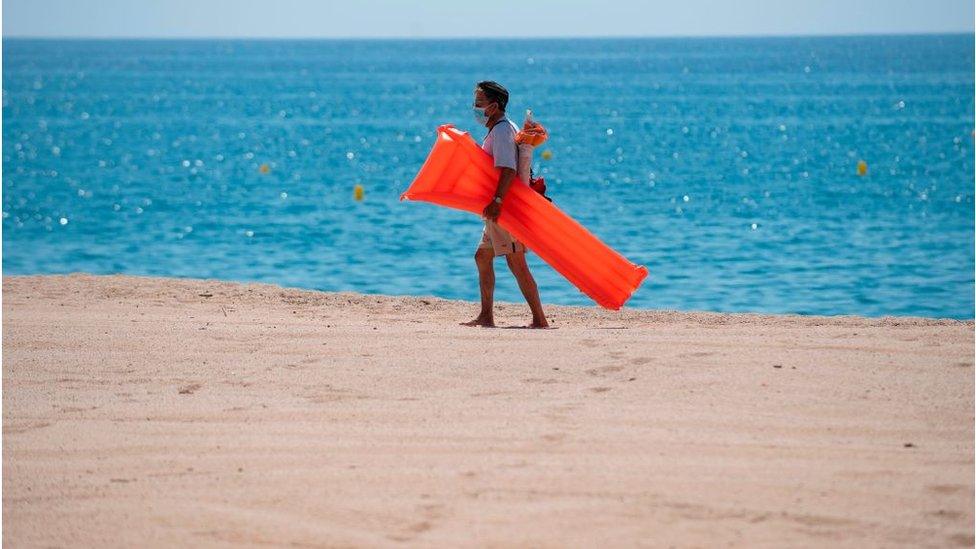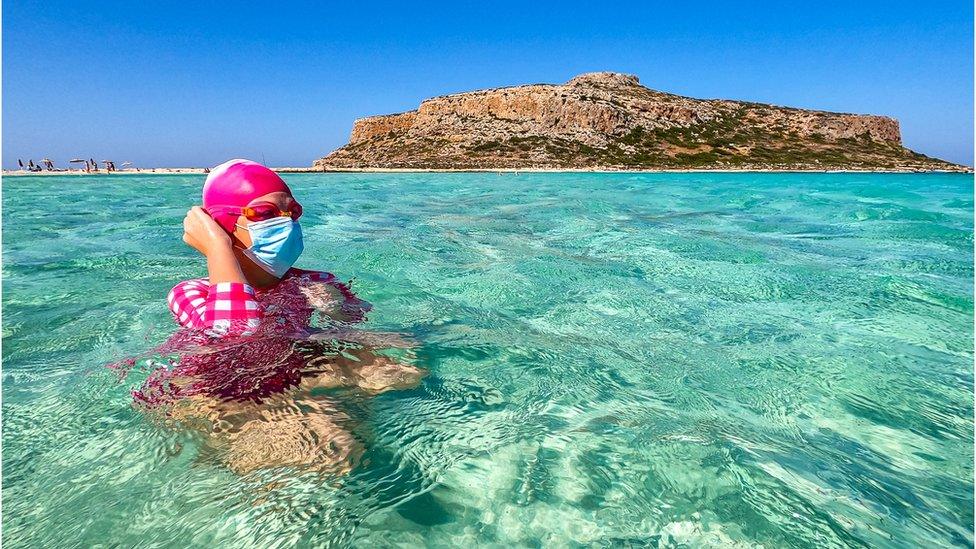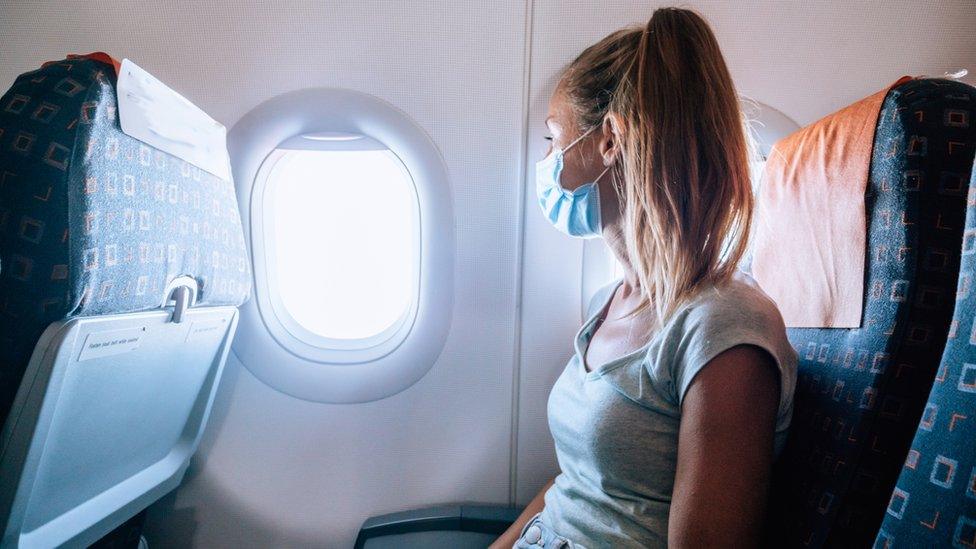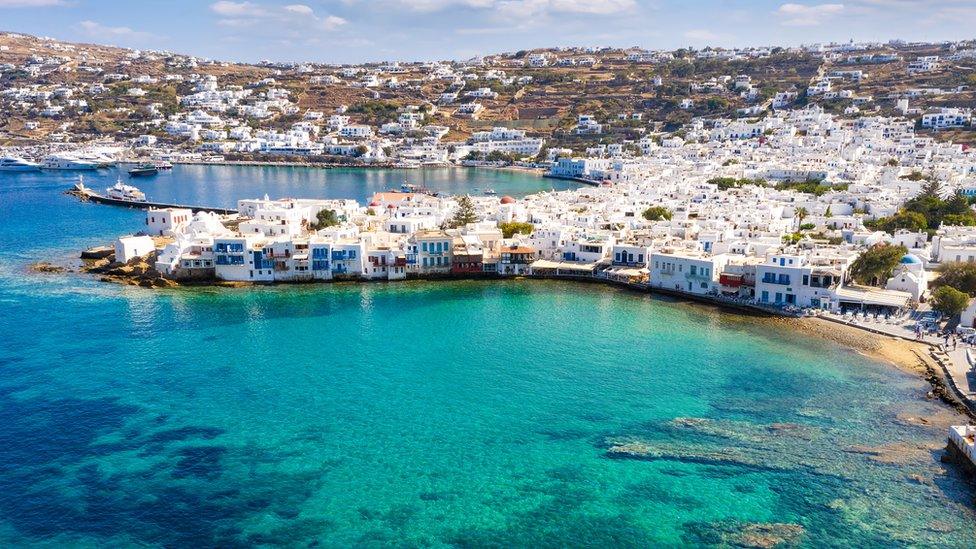On The Beach pulls all summer holidays from sale
- Published
- comments

Online travel agent On The Beach has stopped selling all holidays for this summer due to Covid uncertainty.
The pause in sales until September includes "green list" countries such as Portugal.
By contrast, EasyJet and Tui will begin offering holidays to countries classified as amber, despite government advice remaining not to travel for leisure.
EasyJet said it would let people "make up their own mind about their holiday".
Most countries are currently classed as amber, but it is not illegal to travel to them when holidays resume on 17 May for people in England and Scotland.
Instead, arrivals from these places will be required to quarantine at home for 10 days and take a Covid test before departure and on arrival.
However, On The Beach, one of the biggest UK online travel agents, said it would not be selling any holidays for June, July and August due to "continuing uncertainty around international leisure travel".
The firm's chief executive, Simon Cooper, said: "There's nothing we want more than to be able to send customers on holiday, but with the current number of unknowns, we don't think that now is the right time for customers to book new holidays departing in the next few months."
He told the BBC that many would-be holidaymakers had been "jaded by the experience" of summer 2020, when many holidays that had been booked failed to take place because of shifting travel restrictions.
Mr Cooper added that if On The Beach did go ahead with summer bookings, its profits risked being outweighed by "administrative costs and loss of goodwill".
The Foreign Office stopped advising against all but essential travel to a number of amber destinations last week. However, its advice is based on different criteria to the Department of Transport's advice.
At present, only 12 countries are on the government's "green list" for foreign holidays under the traffic light system for travel, meaning people are not required to quarantine when they get back. But they will need to take a Covid test before departure and another on arrival.
By contrast, those visiting amber countries such as Spain and France must take a Covid test before departure and two more on arrival. They also need to quarantine at home for 10 days when they return.

On The Beach's Mr Cooper said it would not be offering foreign holidays to "green list" countries because "it is very likely that we will see regular fluctuations in destinations' traffic light classifications".
"Given this, there is too much uncertainty for us to take new bookings with confidence that they will go ahead, or for us to know the potential inconvenience or incremental costs that customers might experience or incur," he said.
"Unlike many of our competitors, we have no interest in selling holidays that are unlikely to happen, as our business model enables us to put customers first, rather than needing to get cash in the door to contribute to high fixed costs, and offering refunds in the form of a voucher when holidays get cancelled."
Speaking on Friday, Transport Secretary Grant Shapps said that although holidays abroad would no longer be illegal from Monday 17 May, the government advised against travel to amber countries for leisure.
However, Tui and EasyJet are still going to push ahead with their plans to offer holidays to "amber list" countries.
An EasyJet Holidays spokeswoman said: "We recognise that many our customers do still want their holidays to go ahead, so for 'amber' list destinations where holidays can be enjoyed safely and legally, which do not have 'all but essential travel' warnings and where there is no quarantine requirement in destination, we are providing flexibility and choice so customers can make up their own mind about their holiday."
She added that EasyJet won't operate any holidays to destinations on the "red" list.
Spain talks
Tui's spokeswoman said: "We want to offer our customers flexibility and choice this summer, so where borders are open and FCDO advice allows travel, we will operate to those destinations.
"We know some customers may be unsure about travelling this summer, so we've offered free changes 14 days before travel for anyone due to travel before the end of August."


The flurry of activity by the FCDO at the start of last week led a few to think that they had cracked which countries would be on the green list early. But they spoke too soon; while there is overlap the two are not the same.
The government would say the two lists each serve a different purpose. The Foreign office list is advice to help British travellers assess the risk posed to them if they travel to a country. The traffic light list is about stopping the virus and variants coming into the country.
Essentially, one is about personal risk, one is about national risk. There is still a strong overlap between the two and the fact that the countries differ has still left some passengers and the industry scratching their heads.
Unlike now, there will be no law stopping travellers from going to amber countries, just government advice not to do so for leisure. Doing so will mean quarantine on return and added cost for tests, which will put many off. But after low passenger numbers for over a year, some operators think that it's a price that certain passengers will be willing to pay.

Also on Wednesday, Spain's Foreign Minister Arancha González Laya said the UK should take a regional approach when deciding which places should be on the green list. The country is on the amber list.
She told BBC Breakfast: "We are having good discussions with the UK authorities to convince them there are many regions in Spain - Balearic Islands, Canary Islands, Valencia - where the numbers are equivalent to those in the UK today.
"Maybe if the UK looks with a regional lens they will discover that there are many safe places already in Spain to travel to. Let's keep on working, but it's looking good for British tourists to spend their holidays in Spain this summer."
She said Spain was proceeding at pace with its vaccination effort and that over 30% of Spaniards had already received at least one shot, with six million were fully vaccinated. She said that the country was 98 days away from collective immunity.
Demand shifting to winter
It comes as Tui reported reported a sharp jump in demand for holidays this winter as more people defer their holidays.
As of 2 May, bookings this year for winter 2021/22 breaks were up 17% on the same period in 2019. But total summer bookings were down 69% due to continued uncertainty over travel rules.
Nevertheless, TUI said it expected the safe return of holidays in the coming months.
"The continued vaccination progress across our key customer markets and destinations, combined with more testing, and comprehensive hygiene measures throughout our eco-system, should enable the safe return to holidays this summer," it said.
Due to the ongoing pandemic, third lockdown and travel restrictions, Tui's revenues dived by 89% to €716m (£614.6m) in the six months to March.
However, TUI said customers were keen to travel once Covid restrictions were fully lifted.
It said nearly three times as many Britons have decided to book with the travel giant for the summer of 2022 compared with 2019.
The travel operator said it was focused on reopening a portfolio of destinations strong vaccination coverage and low incidence rates, including the Greek islands, the Balearics, the Canaries and Portugal.
Related topics
- Published11 February 2022

- Published7 May 2021

- Published26 April 2021
